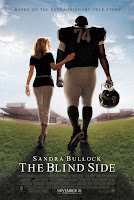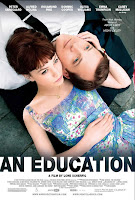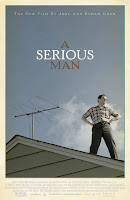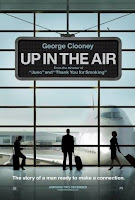It’s over a year late . . . but here it is!
Avatar reviewed by Elizabeth Tiller
Avatar reviewed by Nine Deuce
The Blind Side reviewed by Stephanie Rogers
 “There’s a way to tell a true story, and there’s a way to completely botch the shit out of a true story. Shit-botching, in this instance, might include basing the entire film around an upper-class white woman’s struggle to essentially reform a young Black man by taking him in, buying him clothes, getting him a tutor, teaching him how to tackle, and threatening to kill a group of young Black men he used to hang out with.
“There’s a way to tell a true story, and there’s a way to completely botch the shit out of a true story. Shit-botching, in this instance, might include basing the entire film around an upper-class white woman’s struggle to essentially reform a young Black man by taking him in, buying him clothes, getting him a tutor, teaching him how to tackle, and threatening to kill a group of young Black men he used to hang out with.However, a filmmaker might consider, when telling the true story of Michael Oher’s struggles to overcome his amazing obstacles, to actually base the film on the true story of Michael Oher’s struggles to overcome his amazing obstacles.”
The Blind Side reviewed by Nine Deuce
 “What was the intended message of this film? It won an Oscar, so I know it had to have a message, but what could it have been? I’ve got it (a suggestion from Davetavius)! The message is this: don’t buy more than one Taco Bell franchise or you’ll have to adopt a black guy. I’ll accept that that’s the intended message of the film, because if the actual message that came across in the movie was intentional, I may have to hide in the house for the rest of my life.”
“What was the intended message of this film? It won an Oscar, so I know it had to have a message, but what could it have been? I’ve got it (a suggestion from Davetavius)! The message is this: don’t buy more than one Taco Bell franchise or you’ll have to adopt a black guy. I’ll accept that that’s the intended message of the film, because if the actual message that came across in the movie was intentional, I may have to hide in the house for the rest of my life.”District 9 reviewed by Sarah Domet
 “Perhaps Blomkamp’s vision is to convey the notion that our greatest hope for an internationally practiced humanism is to fully experience the isolation and desperation at the individual level. I want to believe that this is his message. But I fear I may be giving him too much credit, for in the end Blomkamp never fully considers the implications of violent discrimination and segregation on anyone but (white, male) Wikus, the original perpetrator of this alien apartheid in the first place. In the end, Wikus becomes a victim, too, yes. However his victimhood is meant to be understood as a courageous act of martyrdom, and, more specifically, one of choice. After all, Wikus told Christopher Johnson to board the Mothership without him; Wikus would stay behind to fight the bad guys. If nothing else, Wikus was given the luxury of choice and self-determination, a luxury not afforded to the “others” of this film, woman and prawn alike.”
“Perhaps Blomkamp’s vision is to convey the notion that our greatest hope for an internationally practiced humanism is to fully experience the isolation and desperation at the individual level. I want to believe that this is his message. But I fear I may be giving him too much credit, for in the end Blomkamp never fully considers the implications of violent discrimination and segregation on anyone but (white, male) Wikus, the original perpetrator of this alien apartheid in the first place. In the end, Wikus becomes a victim, too, yes. However his victimhood is meant to be understood as a courageous act of martyrdom, and, more specifically, one of choice. After all, Wikus told Christopher Johnson to board the Mothership without him; Wikus would stay behind to fight the bad guys. If nothing else, Wikus was given the luxury of choice and self-determination, a luxury not afforded to the “others” of this film, woman and prawn alike.”An Education reviewed by Jesseca Cornelson
 “The script isn’t bad. After all, if movies didn’t routinely take shortcuts by using familiar, stylized codes for characterization, they couldn’t tell their intricate tales in about 100 minutes. It’s just that the script is so tidy and effective that it doesn’t come anywhere close to transcending its form. At times I wondered if the film would have felt as artful if it had been cast with more familiar Hollywood types, say Julia Roberts as Miss Stubbs or Anne Hathaway as Jenny, both of whom I find exude a sweetness that always makes me aware of how terribly charming they are. Would the film have been as engaging if everyone had American accents? I wonder if audiences’ own aspirations to sophistication might make us a bit blind to how ordinary this film is.”
“The script isn’t bad. After all, if movies didn’t routinely take shortcuts by using familiar, stylized codes for characterization, they couldn’t tell their intricate tales in about 100 minutes. It’s just that the script is so tidy and effective that it doesn’t come anywhere close to transcending its form. At times I wondered if the film would have felt as artful if it had been cast with more familiar Hollywood types, say Julia Roberts as Miss Stubbs or Anne Hathaway as Jenny, both of whom I find exude a sweetness that always makes me aware of how terribly charming they are. Would the film have been as engaging if everyone had American accents? I wonder if audiences’ own aspirations to sophistication might make us a bit blind to how ordinary this film is.”The Hurt Locker reviewed by Amber Leab
 “The Hurt Locker is a powerful anti-war film, which can almost get lost in the breathless action sequences. Its message is subtle but unmistakable: war utterly breaks you. The final scene of the film, which has been criticized for its ambiguity (we see James voluntarily back in action after a brief return home and a too-familiar scene representing shallow American excess), is actually a haunting, almost terrifying reminder of our implication in war. If you see James as a hero at the end of the movie, you haven’t understood a frame of the film you just watched. Yet the film teases us with a traditional genre representation of the hero. We want him to be a hero, only finding joy in the adrenaline rush of war, but he isn’t. He’s an empty shell of a person, nothing more than an animated suit heading toward…nothing. He’s walking off into the abyss. War has ripped out his humanity. This is what we do to our soldiers: we ask them to do the impossible in combat, and it destroys them.”
“The Hurt Locker is a powerful anti-war film, which can almost get lost in the breathless action sequences. Its message is subtle but unmistakable: war utterly breaks you. The final scene of the film, which has been criticized for its ambiguity (we see James voluntarily back in action after a brief return home and a too-familiar scene representing shallow American excess), is actually a haunting, almost terrifying reminder of our implication in war. If you see James as a hero at the end of the movie, you haven’t understood a frame of the film you just watched. Yet the film teases us with a traditional genre representation of the hero. We want him to be a hero, only finding joy in the adrenaline rush of war, but he isn’t. He’s an empty shell of a person, nothing more than an animated suit heading toward…nothing. He’s walking off into the abyss. War has ripped out his humanity. This is what we do to our soldiers: we ask them to do the impossible in combat, and it destroys them.”Inglourious Basterds reviewed by Amanda ReCupido
 “I saw Quentin Tarantino’s Inglorious Basterds when it first came out and then again recently in the sweep of the Oscar season. I remember upon first viewing being surprised that, unlike all the posters and marketing would have you believe, Brad Pitt is not the hero of this story. In fact, it is an unassuming, quiet, doe-eyed Jewish girl, Shosanna (played by Melanie Laurent) who carries the film. Brad Pitt and his cronies just kinda happen to be there, bludgeoning and scalping people (this is, after all, a Tarantino flick), and faltering in their plans to sweep the Nazi regime, while Shosanna plots, schemes, threatens, and even fraternizes with the enemy in her mere disguise as a woman to bring the Third Reich to its knees. It is because no one expects her to plan such an attack that she is not viewed as a threat and able to get away with it. Shosanna’s womanhood is both her handicap and her ultimate weapon.”
“I saw Quentin Tarantino’s Inglorious Basterds when it first came out and then again recently in the sweep of the Oscar season. I remember upon first viewing being surprised that, unlike all the posters and marketing would have you believe, Brad Pitt is not the hero of this story. In fact, it is an unassuming, quiet, doe-eyed Jewish girl, Shosanna (played by Melanie Laurent) who carries the film. Brad Pitt and his cronies just kinda happen to be there, bludgeoning and scalping people (this is, after all, a Tarantino flick), and faltering in their plans to sweep the Nazi regime, while Shosanna plots, schemes, threatens, and even fraternizes with the enemy in her mere disguise as a woman to bring the Third Reich to its knees. It is because no one expects her to plan such an attack that she is not viewed as a threat and able to get away with it. Shosanna’s womanhood is both her handicap and her ultimate weapon.”Precious, Based on the Novel Push by Sapphire reviewed by Carrie Polansky
 “Certainly, all of the issues addressed in the film — including (but not limited to) rape, incest, teen pregnancy, poverty and illiteracy — have been addressed before by other films, and when addressing such topics, it’s all too easy to come off sounding preachy or melodramatic. Precious does not fall in to this trap. Precious addresses these topics honestly and directly, never undermining the horror of it all but still making it clear that these are real aspects of life, and that they aren’t death sentences. Though the character Precious is forced to deal with a huge number of issues that no young woman should ever need to face, the audience is not supposed to pity her. Precious is too strong a character for that.”
“Certainly, all of the issues addressed in the film — including (but not limited to) rape, incest, teen pregnancy, poverty and illiteracy — have been addressed before by other films, and when addressing such topics, it’s all too easy to come off sounding preachy or melodramatic. Precious does not fall in to this trap. Precious addresses these topics honestly and directly, never undermining the horror of it all but still making it clear that these are real aspects of life, and that they aren’t death sentences. Though the character Precious is forced to deal with a huge number of issues that no young woman should ever need to face, the audience is not supposed to pity her. Precious is too strong a character for that.” A Serious Man reviewed by Lesley Jenike
 “The Coens are, in my book, among the most consistently innovative filmmakers working today. And I don’t mean “innovative” in the sense that, as directors, they splice and dice filmic conventions the way Baz Luhrmann or Danny Boyle do, for example. Rather, they’re consummate storytellers, fancy jump cuts be damned, and their stories, no matter how dark, how disconcerting, become somehow universal, funny, and true. What’s ultimately so disconcerting about this movie, however, is its skeptical take on the Judeo-Christian tradition of parable and storytelling as illustration and explanation. The Coen brothers are undermining their own profession here, their own modus operandi, and call into question narrative’s effectiveness in light of a chaotic universe and incomprehensible suffering. It’s a dangerous move but ultimately a rewarding one.”
“The Coens are, in my book, among the most consistently innovative filmmakers working today. And I don’t mean “innovative” in the sense that, as directors, they splice and dice filmic conventions the way Baz Luhrmann or Danny Boyle do, for example. Rather, they’re consummate storytellers, fancy jump cuts be damned, and their stories, no matter how dark, how disconcerting, become somehow universal, funny, and true. What’s ultimately so disconcerting about this movie, however, is its skeptical take on the Judeo-Christian tradition of parable and storytelling as illustration and explanation. The Coen brothers are undermining their own profession here, their own modus operandi, and call into question narrative’s effectiveness in light of a chaotic universe and incomprehensible suffering. It’s a dangerous move but ultimately a rewarding one.” Up reviewed by Travis Eisenbise
 “Insert Pixar dilemma: Pixar has a girl problem. I don’t want to dwell too much on this, as the blogosphere has already run Pixar through the dirt (as it should). Noted in Linda Holmes’ blog on NPR, after 15 years of movie making, Pixar has yet to create a story with a female lead. Ellie is the only female voice in this entire movie and she is dead and gone within the first ten minutes. She’s not even allowed an actual voice as an adult. (see PT: #3). The entire story is told by a male octogenarian and a boy, Russell (voiced by Jordan Nagai), who is seventy years Carl’s junior, and who—instead of being a real-world boy scout—is a Wilderness Explorer (see PT: #2). It is devastating to watch this movie in a theatre of mothers and young girls who are forced to stretch their own experiences into the identities of these stock male characters. (PT #4: Employ an inordinate amount of male writers.)”
“Insert Pixar dilemma: Pixar has a girl problem. I don’t want to dwell too much on this, as the blogosphere has already run Pixar through the dirt (as it should). Noted in Linda Holmes’ blog on NPR, after 15 years of movie making, Pixar has yet to create a story with a female lead. Ellie is the only female voice in this entire movie and she is dead and gone within the first ten minutes. She’s not even allowed an actual voice as an adult. (see PT: #3). The entire story is told by a male octogenarian and a boy, Russell (voiced by Jordan Nagai), who is seventy years Carl’s junior, and who—instead of being a real-world boy scout—is a Wilderness Explorer (see PT: #2). It is devastating to watch this movie in a theatre of mothers and young girls who are forced to stretch their own experiences into the identities of these stock male characters. (PT #4: Employ an inordinate amount of male writers.)” Up in the Air reviewed by Kate Staiger
 “Bingham’s other female sidekick is Alex (Vera Farmiga), a sexy, strong-corporate-woman. She meets Bingham, a fellow super-traveler, in a hotel bar. They hit it off, do the deed, and she becomes the love interest. They exchange contacts and meet for booty calls in cities where they happen to cross paths while on business. As their relationship progresses, he goes through the formal “sworn-bachelor-stumbles-into-love” process, schlepping it all with sentimentality and making it confusing to understand the direction of this movie. Aren’t I supposed to be watching a movie about the tragedies of people losing their jobs? Or am I supposed to be focused on Ryan Bingham’s thawing heart? Or no, it’s this: Ryan Bingham has a hard job and travels a lot. It makes his life experience void of human connections. He is now in the process of making it better as a result of his pesky sidekick on one shoulder, and his hot woman-equivalent on the other. YES!”
“Bingham’s other female sidekick is Alex (Vera Farmiga), a sexy, strong-corporate-woman. She meets Bingham, a fellow super-traveler, in a hotel bar. They hit it off, do the deed, and she becomes the love interest. They exchange contacts and meet for booty calls in cities where they happen to cross paths while on business. As their relationship progresses, he goes through the formal “sworn-bachelor-stumbles-into-love” process, schlepping it all with sentimentality and making it confusing to understand the direction of this movie. Aren’t I supposed to be watching a movie about the tragedies of people losing their jobs? Or am I supposed to be focused on Ryan Bingham’s thawing heart? Or no, it’s this: Ryan Bingham has a hard job and travels a lot. It makes his life experience void of human connections. He is now in the process of making it better as a result of his pesky sidekick on one shoulder, and his hot woman-equivalent on the other. YES!”And you can read all the reviews of the Oscar-nominated films for 2011 in our Best Picture Nominee Review Series: 2011 Roundup.

